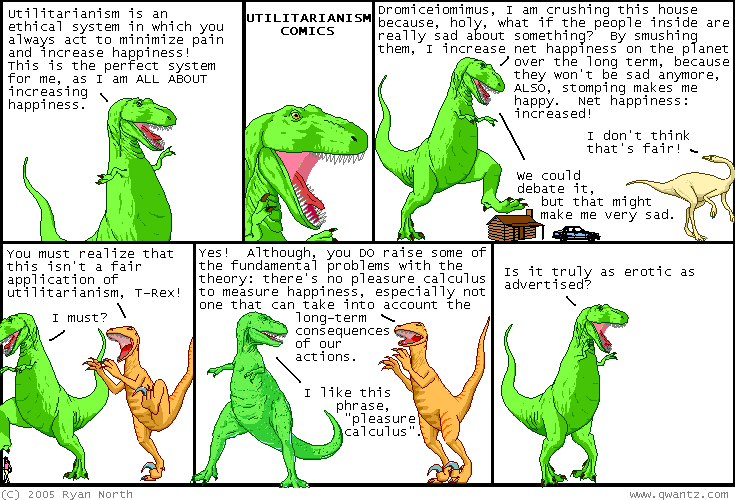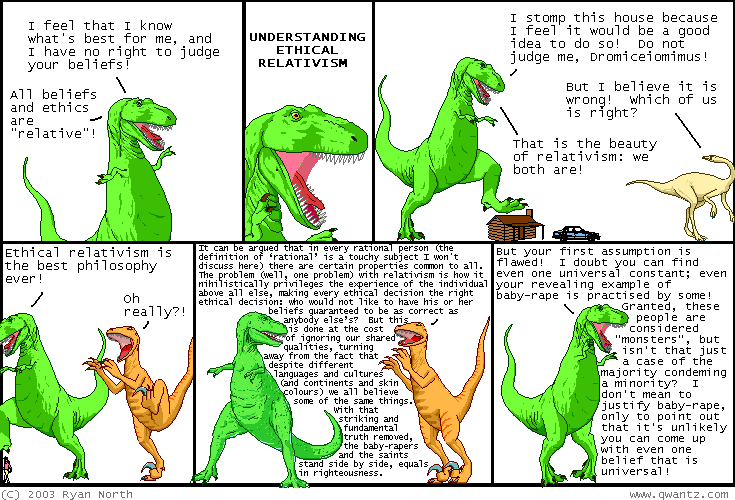Saturday, December 22, 2012
"My Life is Evil"
Comedian Louis CK's take on Peter Singer's argument:
Labels:
applied,
as discussed in class,
charity,
cultural detritus,
videos
Friday, December 21, 2012
Make Sure It Helps
Here's some stuff related to Bill Easterly's critical review of Singer's book that we read for class.
- Easterly is an economist at NYU whose book is called The White Man's Burden: Why the West's Efforts to Aid the Rest Have Done So Much Ill and So Little Good.
- He also ran a blog called Aid Watch with the catchy subtitle, "just asking that aid benefit the poor."
- Some similar websites include GiveWell's blog and Good Intentions Are Not Enough.
- Here's an interesting review of Easterly's book that seriously considers his concerns about giving aid to African nations. I especially recommend reading the last section of the article.
- Here's a great chat between Easterly and Singer:
Thursday, December 20, 2012
Final Exam
Just a reminder: the final exam is Friday, December 21st, in our normal
classroom and at our normal class time. You'll have 50 minutes to take it.


Labels:
as discussed in class,
assignments,
logistics
Wednesday, December 19, 2012
Where to Give?
If you want to donate to an effective charity, check out the following links:
- Affordable, Effective Charities! Against Malaria Foundation or Schistosomiasis Control Initiative (GiveWell's current top-rated charities)
- Research on Effective Charities! Not all non-profits are equal. To figure out the good from the bad, check out GiveWell. Another charity watchdog is Charity Navigator.
- Get Involved! A group of philosophers run Giving What We Can, dedicated to following and promoting Peter Singer's argument to give.
Labels:
applied,
as discussed in class,
charity,
links
Tuesday, December 18, 2012
Extra Credit: "I Could've Done More"
Optional extra credit: Explain how Peter Singer thinks that we are in a similar situation as Oskar Schindler in this scene from Schindler's List. Do you agree with Singer? Why or why not?
The assignment doesn't have to be long (only about a paragraph). It's based on the Peter Singer article on pages 229-236 of the yellow textbook, and is due at the beginning of class on Friday, December 21st. It's worth up to 10 points added to your final grade.
The assignment doesn't have to be long (only about a paragraph). It's based on the Peter Singer article on pages 229-236 of the yellow textbook, and is due at the beginning of class on Friday, December 21st. It's worth up to 10 points added to your final grade.
Labels:
applied,
as discussed in class,
assignments,
charity,
cultural detritus,
links,
videos
Monday, December 17, 2012
New Jersey's Own
 Here's more than you ever wanted on Peter Singer:
Here's more than you ever wanted on Peter Singer:- His recent book on giving is called The Life You Can Save.
- Here he points out the biases that keep us from giving.
- Here he calls out professors for not teaching about poverty.
- Here he updates his argument and offers some specific giving guidelines.
- Here he defends his position against some tough questions.
- And here's his recent appearance on The Colbert Report.
Labels:
applied,
as discussed in class,
charity,
cultural detritus,
links,
singer,
videos
Sunday, December 16, 2012
Torture
Here are some links on the ethics of torture:

- The Stanford Encyclopedia of Philosophy article on torture
- Mark Bowden's survey of interrogation practices
- The United Nation's Convention Against Torture
- Audio interview on the depicted use of torture in the movie Zero Dark Thirty:

Saturday, December 15, 2012
Assisted Dying
Here are a few links on euthanasia:

- Some related ethical issues--like suicide and advanced directives--get their own entries in my favorite free online philosophy encyclopedia.
- The active/passive distinction highlights broader ethical worries: the difference between doing and allowing harms, and the doctrine of double effect.
- Tons of articles, videos, and other resources on euthanasia are available here.
- Last year, a moral philosopher was diagnosed with a brain tumor and wrote an article titled "It is monstrously wrong that patients cannot ask for euthanasia."
- In 1997, some well-known philosophers filed an amicus brief to the U.S. Supreme Court arguing in favor of euthanasia. The court didn't listen: in two separate cases later that year, it decided in favor of upholding bans on euthanasia.

Friday, December 14, 2012
Youth In Asia
Labels:
applied,
as discussed in class,
cultural detritus,
euthanasia,
videos
Thursday, December 13, 2012
Poetic Idol Tonight

It's in the CIM Auditorium from 7:00-9:00 tonight. You can perform or just watch. There's free food for all.
Labels:
as discussed in class,
club promoting,
links
Saturday, December 8, 2012
Quiz #2
Quiz #2 is worth 7.5% of your overall grade,
and will be held at the beginning of class on Monday, December 10th.
You'll have about 25 minutes to complete it. It will consist of
about 5 or 6 short answer questions, and will be on everything we've
covered since the midterm:

- abortion (Warren and Marquis)
- animal ethics (Norcross)
- death penalty (Primoratz, Nathanson)

Labels:
abortion,
animals,
applied,
as discussed in class,
assignments,
death penalty,
logistics
Friday, December 7, 2012
Your Inner Bigot
There's an insightful article called "Finding Your Inner Bigot"
on racism and
sexism that relates to our discussion in class this week: does prejudice have to be conscious, or can we unintentionally
do something sexist or racist?
Psychological evidence suggests that unconscious prejudice is real, and often a bigger problem today than intentionally discriminatory behavior. As the article puts it,

Psychological evidence suggests that unconscious prejudice is real, and often a bigger problem today than intentionally discriminatory behavior. As the article puts it,
"If you ask physicians whether all patients should be treated equally regardless of race, everyone says yes. But if you ask doctors how they will treat patients with chest pains who are named Michael Smith and Tyrone Smith, the doctors tend to be less aggressive in treating the patient with the black-sounding name. Such disparities in treatment are not predicted by the conscious attitudes that doctors profess, but by their unconscious attitudes—their hidden brains."Counteracting these unintentional, hidden prejudices is pretty tough. They require a long-term approach of the kind discussed in Aristotle's virtue ethics: noticing your bad habits, then consciously trying to break them and replace them with better habits. The hardest part about unconscious biases, though, is how difficult they are to notice in the first place.

Labels:
applied,
as discussed in class,
death penalty,
links
Thursday, December 6, 2012
Do You Remember? Prolly Not
Here's a video on the unreliability of eyewitness identification and the tragedy of misidentifying a suspect:
Unfortunately, many jurors seem to prefer eyewitness testimony over forensic evidence. Given how unreliable our memories are, that's pretty scary. Here's a quote:

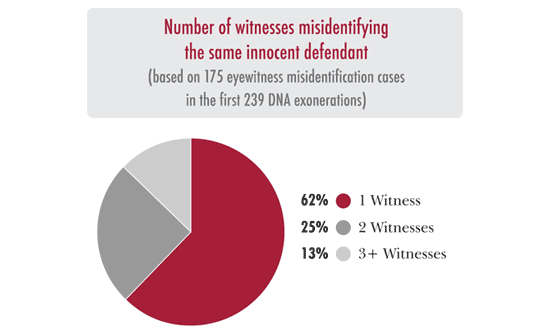
Finally, here's an excellent, short video explanation of the unreliability of memory that ends with a dog licking peanut butter off a guy's face:
Unfortunately, many jurors seem to prefer eyewitness testimony over forensic evidence. Given how unreliable our memories are, that's pretty scary. Here's a quote:
"Despite all our scientific know-how, jurors weighing life and death decisions still crave what Leone calls the 'human element:' the act of watching another person testify and deciding if they’re telling the truth.
"As these witnesses enter the courtroom, a hush often falls on the gallery. Jurors — bored by days of dry testimony given by well-rehearsed experts — lean forward in their seats, pens at the ready to take notes about what the eyewitness has to say. They have seen this moment on television, too, and it’s usually really, really interesting."


Finally, here's an excellent, short video explanation of the unreliability of memory that ends with a dog licking peanut butter off a guy's face:
Labels:
applied,
as discussed in class,
cultural detritus,
death penalty,
links,
videos
Wednesday, December 5, 2012
Unfair and Arbitrary
Here are some links related to Nathanson's article outlining the problems in the U.S. legal system:

- Here's a decent overview article on measuring the reliability of the justice system. How often do courts convict the wrong person?
- Brandon Garrett researched 250 cases in which DNA evidence overturned wrongful convictions. His book is Convicting the Innocent. One of his big points is just how unreliable eyewitness memory can be.
- Most of us don't realize just how much of our memories are complete fabrications. In other words, our memory doesn't work the way we think it does.
- Studies show that arbitrary factors often influence verdicts, such as a defendant's attractiveness, or accent, or willingness to smile, or display of emotion in the courtroom.
- And judges aren't above such biases: judges' verdicts are influenced by all sorts of weird factors, like the time of the day the verdict is made.
- Another big problem is the two-tiered court system: we seem to have one set of rules for the wealthy and powerful, and another set of rules for the rest of us.

Tuesday, December 4, 2012
Crime and Punishment
While we're on the subject of capital punishment, here's some stuff on new research into punishment:
- Mark Kleiman, professor of public policy at UCLA, has a new book called When Brute Force Fails: How to Have Less Crime and Less Punishment. He argues that smaller, swifter punishments can greatly increase deterrence.
- Here's a review of When Brute Force Fails.
- Kleiman runs a blog called Same Facts.
- Here's a video dialogue about Kleiman's book:
Labels:
applied,
as discussed in class,
death penalty,
links,
videos
Monday, December 3, 2012
Death Penalty Box
Here are some links related to our discussion of the death penalty:

- An encyclopedia of philosophy article on the death penalty.
- A large collection of resources on the ethics of capital punishment. I mean, wow.
- What's up with punishment in general? That's a big ethical issue.
- What about the financial cost of the death penalty? Although it's common sense to think that keeping a criminal in prison for life would cost more than putting her to death, studies suggest that the opposite is true. The additional legal battles in death penalty cases may cost more than a life sentence.
- Of course, for some death penalty opponents, it's not about whether innocent people are sentenced to death.

Sunday, December 2, 2012
Does Death Harm Animals?
Here is a short post with some thoughtful analysis regarding the topic of our 2nd paper on the moral status of persons (specifically, on non-persons and killing animals):
I recommend reading it to help you start developing your own arguments on these issues for your paper.

I recommend reading it to help you start developing your own arguments on these issues for your paper.

Labels:
animals,
applied,
as discussed in class,
links,
personhood
Saturday, December 1, 2012
New Jersey's Own
An article we're reading toward the end of the semester was written by by well-known philosopher, utilitarian, vegetarian, and New Jersey resident Peter Singer. He's particularly known for arguing in support of better treatment of animals. Here are some interviews with him:
- Peter Singer on Michael Vick & Dog Fighting
- Audio Interview with Peter Singer
- Animal Research (Peter Singer's Sometimes OK with It!)
Labels:
animals,
applied,
as discussed in class,
cultural detritus,
links,
singer,
utilitarianism,
videos
Friday, November 30, 2012
Paper #2 Guideline
Due Date: The beginning of class on Wednesday, December 19th, 2012
Worth: 10% of your final grade
Assignment: Write an argumentative essay on the topic below. Papers must be typed, and must be between 600-1200 words long. Provide a word count on the first page of the paper. (Most programs like Microsoft Word have automatic word counts.)
Topic: Explain and defend your definition of “person” as it relates to morality, and specifically to the ethics of abortion and animal ethics.

Worth: 10% of your final grade
Assignment: Write an argumentative essay on the topic below. Papers must be typed, and must be between 600-1200 words long. Provide a word count on the first page of the paper. (Most programs like Microsoft Word have automatic word counts.)
Topic: Explain and defend your definition of “person” as it relates to morality, and specifically to the ethics of abortion and animal ethics.
(1) First, briefly explain and critically evaluate the different definitions of “person” that we have discussed in class. Be sure to explain the definition offered by Mary Anne Warren.When outlining your definition of person, be sure to consider and answer the following questions: Which living entities are persons, and which living entities are not persons? Do you believe one needs to be a person in the moral sense in order to be worthy of moral consideration (for instance, do some non-persons have a right to not be killed and a right to not suffer unnecessarily)? Do persons have special moral significance? Can someone have moral rights before they have moral duties? Be sure to fully explain and philosophically defend each of your answers.
(2) Second, explain how each of the following authors uses the concept of “person” to attempt to settle the particular ethical debate she or he wrote about. (Warren and Marquis on abortion, and Norcross on animal ethics).
[NOTE: Many of these authors think personhood is irrelevant to their issue.]
(3) Third, explain and defend your definition of “person”: do you agree with one of the definitions we discussion in class, or do you have one of your own?
(4) Fourth, explain the solution that your definition of “person” gives to the ethical debates of abortion and animal ethics.

Labels:
abortion,
animals,
applied,
as discussed in class,
assignments,
logistics,
personhood
Thursday, November 29, 2012
The Ethics of Killing
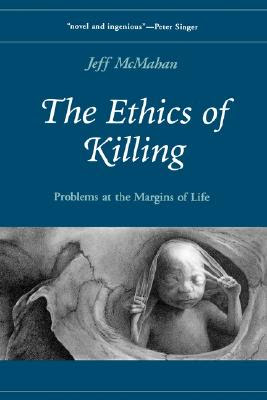 I don't often recommend an entire book to students, but if you're interested in some thoughtful analysis of abortion, euthanasia, animals, killing, and personhood, among other things, you should check out Jeff McMahan's The Ethics of Killing. Here's a short description of the book:
I don't often recommend an entire book to students, but if you're interested in some thoughtful analysis of abortion, euthanasia, animals, killing, and personhood, among other things, you should check out Jeff McMahan's The Ethics of Killing. Here's a short description of the book:"This magisterial work is the first comprehensive study of the ethics of killing, where the moral status of the individual killed is uncertain. Drawing on philosophical notions of personal identity and the immorality of killing, McMahan looks carefully at a host of practical issues, including abortion, infanticide, the killing of animals, assisted suicide, and euthanasia."McMahan teaches philosophy at Rutgers. He also just wrote a follow-up book called Killing in War. This is exactly the kind of careful, thought-out approach that I think complicated, serious issues deserve.
Here's an audio interview with McMahan on personhood.
Labels:
abortion,
animals,
applied,
as discussed in class,
euthanasia,
links,
personhood
Wednesday, November 28, 2012
You Know Chicken's Chicken, Right?
Jonathan Safran Foer--author of the critically acclaimed novel Everything Is Illuminated--has a new book about his decision to not support factory farming called Eating Animals. Here's some stuff on it:

- A thoughtful review of the book by a philosopher.
- Another review: "You Know That Chicken Is Chicken, Right?"
- His appearance on the Colbert Report:

Labels:
animals,
applied,
as discussed in class,
cultural detritus,
links,
more cats? calm down sean,
videos
Tuesday, November 27, 2012
Moopheus
Here are some links on animal ethics:

- David Foster Wallace: Consider the Lobster
- How to Cut Back on Meat Slowly
- What Is The Meatrix? (see video below)
- Vegetarians Still Love the Smell of Bacon
- What If We Could Make Pain-Free Animals?
- Audio Interview: Jeff McMahan on Vegetarianism
- Huge List of Resources on the Moral Status of Animals

Labels:
animals,
applied,
as discussed in class,
cultural detritus,
links,
more cats? calm down sean,
videos
Monday, November 26, 2012
November 26th Class Canceled
I'm sick, so Monday's Ethics class is canceled.
This pushes a few things back on the schedule. Consensus group #1 on animal ethics is now presenting in class on Wednesday, November 28th. Consensus group #2--the Igor Primoratz article on the death penalty--will present on Friday, November 30th, and group #3--the Nathanson article on the death penalty--presents Monday, December 3rd.

This pushes a few things back on the schedule. Consensus group #1 on animal ethics is now presenting in class on Wednesday, November 28th. Consensus group #2--the Igor Primoratz article on the death penalty--will present on Friday, November 30th, and group #3--the Nathanson article on the death penalty--presents Monday, December 3rd.

Labels:
assignments,
consensus,
logistics,
more cats? calm down sean
Thursday, November 22, 2012
Abortion
Here are some links related to our class discussions on the ethics of abortion:

- Recent scientific research suggests that the earliest fetuses can feel pain is about 24 weeks into a pregnancy.
- One philosopher argues that even if you think abortion is morally acceptable, it's controversial and morally risky enough for you to lower your confidence in your own moral judgment.
- Here are two articles debunking the myth of the Mozart Effect that we discussed in one of our classes.

Wednesday, November 21, 2012
Personhood
Here are some links related to our ongoing discussion of the the moral status of persons:

- Here is the Catholic Encyclopedia entry on person.
- Here is a nice essay that examines various proposed criteria for personhood, such as intelligence and the ability to communicate.
- Are dogs persons? One of my favorite radio shows recently devoted 3 episodes to the science of what dogs can and cannot understand. Listen below:
Part One
Part Two
Part Three - How about dolphins: are they sea-persons?

Labels:
abortion,
applied,
as discussed in class,
audio,
links,
personhood
Tuesday, November 20, 2012
Moral Psych Out
Here are some links loosely related to moral psychology:
- Here's a decent explanation of Lawrence Kohlberg's psychological theory of moral development that we mentioned in class.
- Psychological research on our moral judgments is a lot wackier today. For instance, clean smells make us behave better, while smelling farts makes us judge more harshly.
- There's some great new research on moral development in children, too. Here's Rebecca Saxe's TED Talk:
- One large strand of psychological research is on the impact of emotions on our moral reasoning. Here's Jonathan Haidt's TED Talk on the emotional difference between conservatives and liberals:
Labels:
as discussed in class,
feminist,
links,
theories,
videos
Monday, November 19, 2012
Delusions of Gender
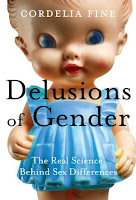
Fine wrote a nice summary of her book here, and there are two good reviews of her book here and here. Below is an excerpt from a talk Fine recently gave.
Cordelia Fine: Discovering Sexism in Neuroscience
Here's a comparison of the different words used in ads for boys’ toys and ads for girls’ toys.


Labels:
as discussed in class,
cultural detritus,
feminist,
links,
theories,
videos
Sunday, November 18, 2012
Ethics of Care
Here's some stuff related to the ethics of care:

- Here's an excerpt from a video of Carol Gilligan explaining her work. The entire video is available here.
- For stuff on feminism in general, I highly recommend one of my favorite blogs: Feminist Philosophers.
- There's also a great blog called What Is It Like to Be a Woman in Philosophy? It's devoted to short accounts from women on their experiences while pursuing a career in philosophy.
- The cartoon Rose Is Rose offers a funny-ish critique of reason-centered approaches to ethics:

Labels:
as discussed in class,
feminist,
links,
theories
Saturday, November 17, 2012
Breaking Habits
"If you want to change a habit, …don’t try and change everything at once. Instead, figure out what the cue is, figure out what the reward is and find a new behavior that is triggered by that cue and delivers that same reward."
Labels:
as discussed in class,
audio,
links,
theories,
virtue
Friday, November 16, 2012
Just Right
Here is a trio of short audio interviews with philosophers talking about Aristotle's virtue ethics. All three interviews come from the "Philosophy Bites" podcast.
And here's a great overview on the current science of self-improvement: when trying to change something about yourself, which techniques work and which don't?

And here's a great overview on the current science of self-improvement: when trying to change something about yourself, which techniques work and which don't?

Labels:
as discussed in class,
audio,
links,
theories,
virtue
Wednesday, November 14, 2012
Consensus Email Tips
I'd like to clarify something. In the email your group (9AM and 10AM) sends me a week before your consensus session presentation, I only want two things:
In other words, I don't expect your group to give a general presentation on your topic. There's no need to go into a detailed explanation of the topic, or explain the science behind your issue, or whatever. Nor do I want you to make up your own argument for what you believe on the issue.
I just want you to present the author's argument as you understand it. I don't care whether you like or dislike this argument; your job is to (fairly) explain it to the rest of the class. If you dislike the arg, you can mention reasons why when you lead the class-wide evaluation of it.
So here's an example of the type of email I expect:
- A formal premise/conclusion version of the main argument in your article.
- Your group's systematic evaluation of this argument (check each premise and the argument's structure).
In other words, I don't expect your group to give a general presentation on your topic. There's no need to go into a detailed explanation of the topic, or explain the science behind your issue, or whatever. Nor do I want you to make up your own argument for what you believe on the issue.
I just want you to present the author's argument as you understand it. I don't care whether you like or dislike this argument; your job is to (fairly) explain it to the rest of the class. If you dislike the arg, you can mention reasons why when you lead the class-wide evaluation of it.
So here's an example of the type of email I expect:
To: slandis@camdencc.edu, other members of your groupThat's it! It doesn't have to be a long email. Just give me the argument and your evaluation of it.
Sent: at least 1 week before our presentation
Subject: Ethics Group #1's Argument
Our Version of Mary Anne Warren's Argument
P1) A fetus is at best a potential person.
P2) A full-fledged person’s rights always outweigh a potential person’s rights.
P3) A pregnant woman’s right to have an abortion outweighs a fetus’s right to life.
C) Abortion is morally acceptable.
Our Evaluation of Her Argument
P1: we buy her definition of 'person,' but others might not...
P2: questionable! While persons' rights IN GENERAL might be more important than non-persons' rights, it's not clear this is ALWAYS true.
P3: this is supported by P2. We actually buy this, but not for the reason that Warren does. Her arg for this isn't the best.
Support: good! P1 and P2 get us to P3, and P3 is just a rewording of the conclusion.
Labels:
applied,
as discussed in class,
assignments,
consensus,
logistics
Wednesday, November 7, 2012
Midterm Exam
Just a reminder: the midterm exam is Friday, November 9th. It's worth 15%
of your overall grade, and will cover everything we've done in
class so far:
The test is a mix of short-answer questions, argument evaluations, and essays. You'll have all 50 minutes of class to take it.
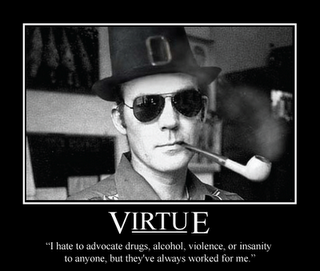
- Doing Philosophy
- Understanding and Evaluating Arguments
- Moral Skepticism vs. Moral Realism
- Divine Command Theory
- Natural Law Theory
- Utilitarianism
- Kant's Ethics
- Virtue Ethics
- Ethics of Care and Feminist Criticisms of Traditional Theories
The test is a mix of short-answer questions, argument evaluations, and essays. You'll have all 50 minutes of class to take it.

Labels:
as discussed in class,
assignments,
divine,
kant,
logistics,
moral skepticism,
natural law,
theories,
utilitarianism,
virtue
Friday, November 2, 2012
Paper #1 Guideline
New Due Date: the beginning of class on Monday, November 12th, 2012
Due Date: the beginning of class on Monday, November 5th, 2012
Worth: 5% of your overall grade
Assignment: Write an essay on one of the topics below in which you support your opinion with an argument. Papers must be typed, and must be between 400-700 words long. Provide a word count on the first page of the paper. (Most programs like Microsoft Word have automatic word counts.)
Possible Paper Topics (Choose ONE of the following topics)
1. Defend a Theory. Out of the seven ethical theories that we’re studying—moral relativism, divine command theory, natural law theory, utilitarianism, Kant’s ethical theory, Aristotle’s virtue ethics, or Gilligan’s ethics of care—which do you think is best? Why? What are two of the best criticisms that someone might make to that theory? How do you reply to those criticisms to defend this theory? Be sure to fully explain & defend your position.
2. Criticize a Theory. Provide a detailed criticism of one of the seven ethical theories we’ve discussed in class. First, briefly explain the theory, and present what you take to be the best criticism(s) of the theory. Then critically evaluate your criticism(s). That is, consider how someone who supports the theory might respond to your criticisms, and explain why you think these responses are unsuccessful.
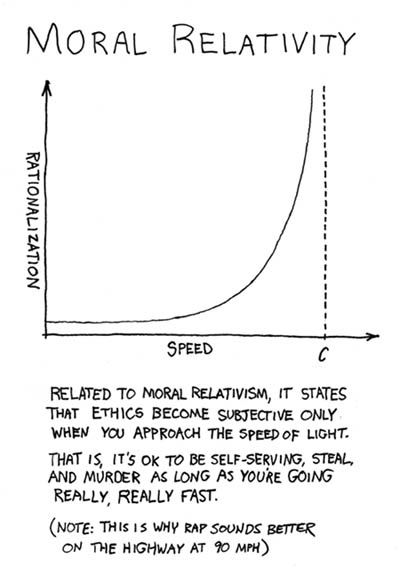 3. Moral
Realism. Moral realists believe (a) moral claims are objectively true or
false. Many moral realists also believe (b) there are no authorities whose
decrees make things morally right or wrong. Are these two claims consistent with
each other? Be sure to fully explain & defend your answer.
3. Moral
Realism. Moral realists believe (a) moral claims are objectively true or
false. Many moral realists also believe (b) there are no authorities whose
decrees make things morally right or wrong. Are these two claims consistent with
each other? Be sure to fully explain & defend your answer.
4. Facts, Opinions, & the Hitler Intuition. In class, we’re discussing the “Hitler Intuition”: Many people think that Hitler’s moral beliefs were not just different from ours; they were mistaken. Many use this intuition as evidence against moral relativism, and support for moral realism. Examine this intuition.
6. Choose Your Own Adventure! Write on a topic of your choosing related to some or one of the ethical theories we’ve discussed in class. (Sean must approve your topic by Friday, March 9th).
NOTE: This is not a research paper! I expect you to explain and defend these theories based on our discussions in class. You are not expected to do any outside research. (If you do, however, be sure to cite your sources.)
Due Date: the beginning of class on Monday, November 5th, 2012
Worth: 5% of your overall grade
Assignment: Write an essay on one of the topics below in which you support your opinion with an argument. Papers must be typed, and must be between 400-700 words long. Provide a word count on the first page of the paper. (Most programs like Microsoft Word have automatic word counts.)
Possible Paper Topics (Choose ONE of the following topics)
1. Defend a Theory. Out of the seven ethical theories that we’re studying—moral relativism, divine command theory, natural law theory, utilitarianism, Kant’s ethical theory, Aristotle’s virtue ethics, or Gilligan’s ethics of care—which do you think is best? Why? What are two of the best criticisms that someone might make to that theory? How do you reply to those criticisms to defend this theory? Be sure to fully explain & defend your position.
2. Criticize a Theory. Provide a detailed criticism of one of the seven ethical theories we’ve discussed in class. First, briefly explain the theory, and present what you take to be the best criticism(s) of the theory. Then critically evaluate your criticism(s). That is, consider how someone who supports the theory might respond to your criticisms, and explain why you think these responses are unsuccessful.
 3. Moral
Realism. Moral realists believe (a) moral claims are objectively true or
false. Many moral realists also believe (b) there are no authorities whose
decrees make things morally right or wrong. Are these two claims consistent with
each other? Be sure to fully explain & defend your answer.
3. Moral
Realism. Moral realists believe (a) moral claims are objectively true or
false. Many moral realists also believe (b) there are no authorities whose
decrees make things morally right or wrong. Are these two claims consistent with
each other? Be sure to fully explain & defend your answer.4. Facts, Opinions, & the Hitler Intuition. In class, we’re discussing the “Hitler Intuition”: Many people think that Hitler’s moral beliefs were not just different from ours; they were mistaken. Many use this intuition as evidence against moral relativism, and support for moral realism. Examine this intuition.
-If you agree that it is solid evidence for moral realism, explain exactly how this intuition works. What makes it objectively true that Hitler was immoral? What is the basis of your judgment? In other words, what makes moral claims objectively true? Which ethical theory we’ve discussed do you think this supports? Explain and defend all your answers.5. The Euthyphro Dilemma. The most common criticism of divine command theory is the Euthyphro dilemma: “Is an action good because God commands it, or does God command it because it is good?” Explain and evaluate this criticism. How is it a criticism of divine command theory? Do you think this is a good or bad criticism of divine command theory? Be sure to fully explain & defend your answer.
-If you do not believe that this intuition is solid evidence for objective morality, you are probably a relativist. Explain why this intuition doesn’t provide enough evidence for the existence of an objective morality. Why is it OK to say that Hitler’s actions weren’t objectively immoral? How is it that Hitler is simply bad to me, but not objectively bad?
6. Choose Your Own Adventure! Write on a topic of your choosing related to some or one of the ethical theories we’ve discussed in class. (Sean must approve your topic by Friday, March 9th).
NOTE: This is not a research paper! I expect you to explain and defend these theories based on our discussions in class. You are not expected to do any outside research. (If you do, however, be sure to cite your sources.)
Labels:
as discussed in class,
logistics,
theories
Thursday, November 1, 2012
Everybody Thinks They're a Good Person
Labels:
as discussed in class,
audio,
cultural detritus,
links,
theories,
virtue
Sunday, October 28, 2012
10/29 Classes Canceled
Due to Hurricane Sandy, Camden County College has canceled all classes and activities for Monday, October 29th.
Friday, October 26, 2012
Vaudevillian Dialectic

Labels:
as discussed in class,
cultural detritus,
kant,
theories
Thursday, October 25, 2012
Kantian Links
Here are some links related to Immanuel Kant's theory of ethics:

- An intermediate overview of Kant's theory of ethics.
- An advanced overview of Kant's ethics.
- Kant's theory is deontological (which is a fancy word that basically means morality is about more than just the consequences of an action). Here's an advanced overview of deontological ethics.
- Some harsh criticisms of Kant's ethical judgments. My favorite excerpt: "Kant's philosophical moral reasoning appears mainly to have confirmed his prejudices and the ideas inherited from his culture. Therefore, we should be nervous about expecting more from the philosophical moral reasoning of people less philosophically capable than Kant."
- A 3-minute video on Kant's ethics is below:

Labels:
as discussed in class,
kant,
links,
theories,
videos
Friday, October 19, 2012
Consensus Groups: 10:00 a.m. Class
Here are the groups for our consensus sessions in the 10:00 class, along with the article you're assigned to present on and the date you're presenting:

Animal EthicsIf you haven't been assigned to a group yet, let me know as soon as possible so we can get you assigned to one.
-Group 1 on November 19 (email due Nov. 12) (Norcross article - YELLOW pgs. 307-322): Dennis, Kate, Ryan
The Death Penalty
-Group 2 on November 26 (email due Nov. 19) (Primoratz article – YELLOW pgs. 388-397): Lou, Mike H., Rich
-Group 3 on November 28 (email due Nov. 21) (Nathanson article – YELLOW pgs. 398-407): Jessenia, Tiffany, Tim
Euthanasia
-Group 4 on December 5 (email due November 28) (Rachels article - YELLOW pgs. 266-271): Alexandra A., Dylan, Kristin
Torture
-Group 5 on December 7 (email due Nov. 30) (Dershowitz article – YELLOW pgs. 293-306): Alex, Elizabeth, Sam
Environmental Ethics
-Group 6 on December 12 (email due Dec. 5) (Hill article – YELLOW pgs. 336-350): Devon, Ian
Charity
-Group 7 on December 14 (email due Dec. 7) (Singer article – YELLOW pgs. 229-236): Amy, Gianna, Mike C.
-Group 8 on December 17 (email due December 10) (Easterly handout: available here): no one

Consensus Groups: 9:00 a.m. Class
Here are the groups for our consensus sessions in the 9:00 class, along with the article you're assigned to present on and the date you're presenting:

Animal EthicsIf you haven't been assigned to a group yet, let me know as soon as possible so we can get you assigned to one.
-Group 1 on November 19 (email due Nov. 12) (Norcross article - YELLOW pgs. 307-322): Destinee, Kelly K, Kellie S.
The Death Penalty
-Group 2 on November 26 (email due Nov. 19) (Primoratz article – YELLOW pgs. 388-397): Andrew P., Caitlin, Courtney, Nora, Rebecca
-Group 3 on November 28 (email due Nov. 21) (Nathanson article – YELLOW pgs. 398-407): Allen, Andrew M., Ariel, Shauna
Euthanasia
-Group 4 on December 5 (email due November 28) (Rachels article - YELLOW pgs. 266-271): Joy, Katherin, Ryan, Tarra
Torture
-Group 5 on December 7 (email due Nov. 30) (Dershowitz article – YELLOW pgs. 293-306): Justin, Mike J., Mike Li., Sean
Environmental Ethics
-Group 6 on December 12 (email due Dec. 5) (Hill article – YELLOW pgs. 336-350): Brad, Mauricio, Mike Le., Paul
Charity
-Group 7 on December 14 (email due Dec. 7) (Singer article – YELLOW pgs. 229-236): A.C., Anthony, Chris, Joseph
-Group 8 on December 17 (email due December 10) (Easterly handout: http://online.wsj.com/article/SB123621201818134757.html): no one

Consensus Session Guidelines
During the 2nd half of the semester we’ll be holding group presentations (9 a.m. class or 10 a.m. class) on specific issues we’ll be discussing in class. Your group’s assignment is to figure out the main argument from a specific article, then present that argument to your classmates in class and lead a discussion about whether the argument is good or bad. More specific directions are below:
Preparing for the Consensus Session
First, your group’s job is to understand and evaluate the argument contained in the readings for your issue.
Running the Consensus Session
During your consensus session, your group’s job is to present your article’s argument to the rest of the class, and lead a class-wide consensus session on each argument. Each group member should present about the same amount.
Preparing for the Consensus Session
First, your group’s job is to understand and evaluate the argument contained in the readings for your issue.
UnderstandYour group must email me (1) your version of the argument and (2) your group's evaluation of it one week before you’re scheduled to lead a session. I will provide helpful feedback, and make sure you’re on the right track.
1. Figure out the argument in your assigned article, and summarize it in a clear premise/conclusion format.
NOTE: Try to keep the argument concise and easy to understand.
Evaluate
2. Evaluate the argument as a group. Check each premise, and check the argument’s support.
3. When evaluating, play the back & forth game. That is, consider as many responses to the argument and your criticisms of it as you can think of. Is the argument misguided? Mistaken? Can you revise the argument to overcome the criticisms you come up with?
4. Try to reach a group-wide consensus on your evaluation of the argument.
NOTE: It doesn’t matter which side you end up on! The goal isn’t to show there’s something wrong about the argument. Nor do I want you to defend the argument no matter what. The goal is to figure out whether it’s good or bad.
Running the Consensus Session
During your consensus session, your group’s job is to present your article’s argument to the rest of the class, and lead a class-wide consensus session on each argument. Each group member should present about the same amount.
Presenting the ArgumentThis is worth 150 points (15% of your overall grade). Except in unusual circumstances, each group member will receive the same grade.
1. Explain the main point of the reading.
2. Explain the author’s argument in support of this main point. (Explain it slowly and clearly, like you’re teaching it to the class. Explain what each premise means in easy-to-understand language. Point out exactly where each premise came from in the reading. Explain why the author believes each premise is true.)
3. Hold a small question and answer round with the class to explain and clarify the argument before evaluating it.
Consensus Voting
4. Run a consensus session (a thumbs up/thumbs down vote) with the rest of class where you evaluate the first premise of the argument.
5. Call on students to explain their evaluation (especially those who voted thumbs down or in the middle).
6. Go back & forth with every dissenter with the goal of trying to reach a consensus (complete agreement for the whole class). At this point, you can briefly explain your group’s evaluation of the premise, along with why your group evaluated it the way you did.
7. Based on the class-wide discussion, revise, defend, or clarify the argument as needed. Revote on any revisions.
8. Repeat steps 4 through 7 to evaluate each remaining premise and the argument’s support.
Labels:
as discussed in class,
assignments,
consensus,
logistics
Wednesday, October 17, 2012
The Psychology of Happiness
Since utilitarianism focuses so much on happiness, I thought I'd share some links on the cool new psychological research on happiness popping up lately.
- Here's a great overview of the psychology of happiness. And here is another, and another.
- Recent studies suggest that our baseline level of happiness doesn't change much throughout our life. So, even if we won the lottery, we wouldn't wind up that much happier. This is potentially very depressing news, although some say there's room for some optimism, and others think the research is wrong.
- There's an insightful, accessible book by Harvard psychologist Dan Gilbert called Stumbling on Happiness. One of his big points is that we often don't know what makes us happy. Here's Gilbert's appearance on The Colbert Report:
- And here's Gilbert giving an awesome TED talk on his research:
Labels:
as discussed in class,
cultural detritus,
links,
theories,
utilitarianism,
videos
Tuesday, October 16, 2012
Utilitarios
Here are some links on the theory of utilitarianism:
- A neat little biography of know-it-all John Stuart Mill.
- An advanced encyclopedia article from my favorite free online philosophy encyclopedia on utilitarianism and other theories that focus on consequences of an action.
- (Yes, there is more than one free online philosophy encyclopedia. Here's another encyclopedia's entry on the same topic.)
- The trolley problem gets brought up a lot when evaluating utilitarianism. A short video intro on it is below. Also, there's some new research on the psychology of the trolley problem.
Labels:
as discussed in class,
links,
theories,
utilitarianism,
videos
Wednesday, October 10, 2012
Natty Law
Here's a Bloggingheads video dialogue explaining and debating natural law theory:
Bloggingheads is a great resource that I've learned a lot from. They post conversations between smart people on all sorts of interesting topics. I recommend browsing the site, or checking out some of my favorites.

Bloggingheads is a great resource that I've learned a lot from. They post conversations between smart people on all sorts of interesting topics. I recommend browsing the site, or checking out some of my favorites.

Thursday, October 4, 2012
Am I A Jerk Because I Annoy You, Or Do I Annoy You Because I'm A Jerk?
Let's evaluate divine command theory!
- Two quick explanations (one and two) of the Euthyphro dilemma, the big criticism of divine command theory
- Some responses to the Euthyphro dilemma
- Other criticisms of divine command theory
- Important question: do the robot gods love what is pious because it is pious, or is something pious because it is loved by the robot gods?
- Let's hear God's response:
- But for obvious reasons, this one's my favorite:
Labels:
as discussed in class,
cultural detritus,
divine,
links,
more cats? calm down sean,
theories,
videos
Wednesday, October 3, 2012
God Ethics
Here are some links on divine command theory:

- A really nice overview of divine command theory
- A more advanced overview of divine command theory
- An article on the relationship between religion and morality
- Lots of philosophy links related to the broader question of whether there is or is not a god

Thursday, September 27, 2012
Moral Factoids
Here are some more links on the debate between moral skepticism and moral realism.

- Philippa Foot was a great moral philosopher who sadly passed away last year. She spent a lot of her career arguing for moral realism.
- An argument against moral skepticism: in an important sense, cultures morally agree more than they disagree.
- Some experimental philosophers are trying to find out whether people actually believe in objective moral truths.
- Who's to say what's right or wrong? How about philosophers?

Labels:
as discussed in class,
links,
moral skepticism
Wednesday, September 26, 2012
Quiz You Once, Shame On Me
The first quiz will be held at the beginning of class on Friday, September 28th. You will have about 25 minutes to take it. The quiz is
worth 7.5% of your overall grade.
There will be three sections: the first section is on evaluating arguments, and will look like the group work on evaluating arguments we did in class last week. Then there will be a section with 5 specific claims that you will have to identify as either subjective or objective. The final section will consist of 3 or 4 short answer questions on the topic of moral skepticism and moral realism (Are there objectively correct answers to moral questions?) These questions will be based on our class discussions of chapters 19 and 21 from the BLUE book and chapter 21 from the YELLOW book.

There will be three sections: the first section is on evaluating arguments, and will look like the group work on evaluating arguments we did in class last week. Then there will be a section with 5 specific claims that you will have to identify as either subjective or objective. The final section will consist of 3 or 4 short answer questions on the topic of moral skepticism and moral realism (Are there objectively correct answers to moral questions?) These questions will be based on our class discussions of chapters 19 and 21 from the BLUE book and chapter 21 from the YELLOW book.

Labels:
arguments,
as discussed in class,
assignments,
links,
moral skepticism
Friday, September 21, 2012
Relative to You, But Not to Me
Here are some links on our first topic: are there objectively correct and incorrect answers to moral questions?
- Cartoon T-Rex also says, "Beware of the relativist fallacy!"
- Philosopher Jesse Prinz offers a defense of moral relativism.
- An interview with moral psychologist Jonathan Haidt, who supports a version of moral relativism.
- A pretty severe criticism of Haidt's defense of relativism.
- (Haidt gave a cool TED talk on the moral roots of liberals and conservatives.)
- A detailed overview of various versions of moral skepticism from my favorite free online philosophy encyclopedia.
- That encyclopedia's entry on moral relativism.
- (Yes, there is more than one free online philosophy encyclopedia. Here's another encyclopedia's entry on moral relativism.)

Labels:
as discussed in class,
links,
moral skepticism
Sunday, September 16, 2012
Evaluating Arguments Handout
Here are the answers to the handout on evaluating arguments that we did as group work in class.
1) All bats are mammals.
All mamammals live on earth.
All bats live on earth.
All frogs are amphibians.
No frogs are humans.
All bats have wings.
All mammals have wings.
All bearded people are mean.
Some dads are mean.
Some people ate tacos yesterday.
Oprah Winfrey ate tacos yesterday.
All humans are mammals.
All students in here are humans.
 9) All hornets are wasps.
9) All hornets are wasps.
All wasps are insects.
All insects are scary.
All hornets are scary.
Sean is singing right now.
Students are cringing right now.
Sean isn't singing right now.
Students aren't cringing right now.
Most humans are shorter than 7 feet tall.
Most students in here are shorter than 7 feet tall.
Bush was either a great prez or the greatest prez.
Bush wasn’t the greatest prez.
Bush was a great prez.
Students are cringing right now.
Sean is singing right now.
Students aren't cringing right now.
Sean isn't singing right now.
Life isn't meaningless.
There is a God.

1) All bats are mammals.
All mamammals live on earth.
All bats live on earth.
P1- true
P2- true
support- good
overall- good
2) All email forwards are annoying.
Some email forwards are false.
Some annoying things are false.
All females in this class are humans.
All males in this class are females.
Some email forwards are false.
Some annoying things are false.
P1- questionable ("annoying" is subjective)3) All males in this class are humans.
P2- true
support- good (the premises establish that some email forwards are both annoying and false; so some annoying things [those forwards] are false)
overall - bad (bad first premise)
All females in this class are humans.
All males in this class are females.
P1- true4) No humans are amphibians.
P2- true
support- bad (the premises only tell us that males and females both belong to the humans group; we don't know enough about the relationship between males and females from this)
overall- bad (bad support)
All frogs are amphibians.
No frogs are humans.
P1- true5) All bats are mammals.
P2- true
support- good (the premises say that frogs belong to a group that humans can't belong to, so it follows that no frogs are humans)
overall- good
All bats have wings.
All mammals have wings.
P1- true6) Some dads have beards.
P2- true (if interpreted to mean "All bats are the sorts of creatures who have wings.") or false (if interpreted to mean "Each and every living bat has wings," since some bats are born without wings)
support- bad (we don't know anything about the relationship between mammals and winged creatures just from the fact that bats belong to each group)
overall- bad (bad support)
All bearded people are mean.
Some dads are mean.
P1- true7) Oprah Winfrey is a person.
P2- questionable ("mean" is subjective)
support- good (if all the people with beards were mean, then the dads with beards would be mean, so some dads would be mean)
overall- bad (bad 2nd premise)
Some people ate tacos yesterday.
Oprah Winfrey ate tacos yesterday.
P1- true8) All students in here are mammals.
P2- true (you might not have directly seen anyone eat tacos, but you have a lot of indirect evidence... with all the Taco Bells, Don Pablos, etc., surely lots of people ate tacos yesterday)
support- bad (the 2nd premise only says some ate tacos; Oprah could be one of the people who didn't)
overall- bad (bad support)
All humans are mammals.
All students in here are humans.
P1- true
P2- true
support- bad (the premises only tell us that students and humans both belong to the mammals group; we don't know enough about the relationship between students and humans from this; for instance, what if a dog were a student in our class?)
overall- bad (bad structure)
 9) All hornets are wasps.
9) All hornets are wasps.All wasps are insects.
All insects are scary.
All hornets are scary.
P1- true!10) If Sean sings, then students cringe.
P2- true
P3- questionable ("scary" is subjective)
support- good (same structure as in argument #1, just with an extra premise)
overall- bad (bad 3rd premise)
Sean is singing right now.
Students are cringing right now.
P1- questionable (since you haven't heard me sing, you don't know whether it's true or false)11) If Sean sings, then students cringe.
P2- false
support- good
overall- bad (bad premises)
Sean isn't singing right now.
Students aren't cringing right now.
P1- questionable (again, you don't know)12) All students in here are humans.
P2- true
support- bad (from premise 1, we only know what happens when Sean is singing, not when he isn't singing; students could cringe for a different reason)
overall- bad (bad 1st premise and structure)
Most humans are shorter than 7 feet tall.
Most students in here are shorter than 7 feet tall.
P1- true13) (from Stephen Colbert)
P2- true!
support- so-so (the premises state a strong statistical generalization over a large population, and the conclusion claims that this generalization holds for a much smaller portion of that population; while it could be true that the humans in here are a statistical anomaly, given the strength of the generalization, it's likely that most students in here are, in fact, shorter than 7 feet tall)
overall- so-so (not perfect, since the support isn't perfect, but pretty good)
Bush was either a great prez or the greatest prez.
Bush wasn’t the greatest prez.
Bush was a great prez.
P1- questionable ("great" is subjective)14) If Sean sings, then students cringe.
P2- questionable ("great" is subjective)
support- good (it's either A or B; it's not A; so it's B)
overall- bad (bad premises)
Students are cringing right now.
Sean is singing right now.
P1- questionable (again, you don't know)15) If Sean sings, then students cringe.
P2- false
structure- bad (from premise 1, we only know that Sean singing is one way to guarantee that students cringe; just because they're cringing doesn't mean Sean's the one who caused it; again, students could cringe for a different reason)
overall- bad (bad premises and structure)
Students aren't cringing right now.
Sean isn't singing right now.
P1- questionable (again, you don't know)16) If there is no God, then life is meaningless.
P2- true
structure- good
overall- bad (bad 1st premise)
Life isn't meaningless.
There is a God.
P1- questionable (that's not an obvious claim to prove or disprove)
P2- questionable (again, that's not an obvious claim to prove or disprove)
support- good (the same structure as argument #13)
overall- bad (bad premises)

Thursday, September 13, 2012
An Argument's Support
One of the trickier concepts to understand in this course is the structure (or
support) of an argument. This is a more detailed explanation of
the term (it's the same as the handout). If you've been struggling
to understand this term, the following might help you.
An argument's structure is its underlying logic; the way the premises and conclusion logically relate to one another. The structure of an argument is entirely separate from the actual meaning of the premises. For instance, the following three arguments, even though they're talking about different things, have the exact same structure:
1) All tigers have stripes.
Tony is a tiger.
Tony has stripes.
2) All humans have wings.
Sean is a human.
Sean has wings.
3) All blurgles have glorps.
Xerxon is a blurgle.
Xerxon has glorps.
There are, of course, other, non-structural differences in these three arguments. For instance, the tiger argument is overall good, since it has a good structure AND true premises. The human/wings argument is overall bad, since it has a false premise. And the blurgles argument is just crazy, since it uses made up words. Still, all three arguments have the same underlying structure (a good structure):
All A's have B's.
x is an A.
x has B's.
Evaluating the structure of an argument is tricky. Here's the main idea regarding what counts as a good structure: the premises provide us with enough information for us to figure out the conclusion from them. In other words, the premises, if they were true, would logically show us that the conclusion is true. So, if you believed the premises, they would convince you that the conclusion is worth believing, too.
Note I did NOT say that the premises are actually true in a good-structured argument. Structure is only about truth-preservation, not about whether the premises are actually true or false. What's "truth preservation" mean? Well, truth-preserving arguments are those whose structures are such that if you stick in true premises, you get a true conclusion.
The premises you've actually stuck into this particular structure could be good (true) or bad (false). That's what makes evaluating an arg's structure so weird. To check the structure, you have to ignore what you actually know about the premises being true or false.
Good Structured Arguments
If we assume that all the premises are true, then the conclusion will also be true for an argument to have a good structure. Notice we are only assuming truth, not guaranteeing it. Again, this makes sense, because we’re truth-preservers: if the premises are true, the conclusion that follows will be true.
EXAMPLES:
1) All humans are mammals.
All mammals have hair.
All humans have hair.
2) If it snows, then it’s below 32 degrees.
It is snowing right now.
It’s below 32 degrees right now.
3) All humans are mammals.
All mammals have wings.
All humans have wings.
4) Either Yao is tall or Spud is tall.
Yao is not tall.
Therefore, Spud is tall.
Even though arguments 3 and 4 are ultimately bad, they still have good structure (their underlying form is good). The second premise of argument 3 is false—not all mammals have wings—but it has the same exact structure of argument 1—a good structure. Same with argument 4: the second premise is false (Yao Ming is about 7 feet tall), but the structure is good (it’s either this or that; it’s not this; therefore, it’s that).
To evaluate the structure, then, assume that all the premises are true. Imagine a world in which all the premises are true. In that world, are you able to figure out from the premises that the conclusion is also true? Or can you imagine a scenario in that world in which the premises are true, but the conclusion is still false? If you can imagine this situation, then the argument's structure is bad. If you cannot, then the argument is truth-preserving (inputting truths gives you a true output), and thus the structure is good.
Bad Structured Arguments
In an argument with a bad structure, you can’t draw the conclusion from the premises – the premises don’t give you enough information. Bad structured arguments do not preserve truth.
EXAMPLES:
1) All humans are mammals.
All whales are mammals.
All humans are whales.
2) If it snows, then it’s below 32 degrees.
It doesn’t snow.
It’s not below 32 degrees.
3) All humans are mammals.
All students in our class are mammals.
All students in our class are humans.
4) Either Yao is tall or Spud is short.
Yao is tall.
Spud is short.
Even though arguments 3 and 4 have all true premises and a true conclusion, they are still have a bad structure, because their form is bad. Argument 3 has the same exact structure as argument 1—a bad structure (it doesn’t preserve truth).
Even though in the real world the premises and conclusion of argument 3 are true, we can imagine a world in which all the premises of argument 3 are true, yet the conclusion is false. For instance, imagine that our school starts letting dogs take classes. The second premise would still be true, but the conclusion would then be false.
The same goes for argument 4: even though Spud is short (Spud Webb is around 5 feet tall), this argument doesn’t guarantee this. The structure is bad (it’s either this or that; it’s this; therefore, it’s that, too.). We can imagine a world in which Yao is tall, the first premise is true, and yet Spud is tall, too.

An argument's structure is its underlying logic; the way the premises and conclusion logically relate to one another. The structure of an argument is entirely separate from the actual meaning of the premises. For instance, the following three arguments, even though they're talking about different things, have the exact same structure:
1) All tigers have stripes.
Tony is a tiger.
Tony has stripes.
2) All humans have wings.
Sean is a human.
Sean has wings.
3) All blurgles have glorps.
Xerxon is a blurgle.
Xerxon has glorps.
There are, of course, other, non-structural differences in these three arguments. For instance, the tiger argument is overall good, since it has a good structure AND true premises. The human/wings argument is overall bad, since it has a false premise. And the blurgles argument is just crazy, since it uses made up words. Still, all three arguments have the same underlying structure (a good structure):
All A's have B's.
x is an A.
x has B's.
Evaluating the structure of an argument is tricky. Here's the main idea regarding what counts as a good structure: the premises provide us with enough information for us to figure out the conclusion from them. In other words, the premises, if they were true, would logically show us that the conclusion is true. So, if you believed the premises, they would convince you that the conclusion is worth believing, too.
Note I did NOT say that the premises are actually true in a good-structured argument. Structure is only about truth-preservation, not about whether the premises are actually true or false. What's "truth preservation" mean? Well, truth-preserving arguments are those whose structures are such that if you stick in true premises, you get a true conclusion.
The premises you've actually stuck into this particular structure could be good (true) or bad (false). That's what makes evaluating an arg's structure so weird. To check the structure, you have to ignore what you actually know about the premises being true or false.
Good Structured Arguments
If we assume that all the premises are true, then the conclusion will also be true for an argument to have a good structure. Notice we are only assuming truth, not guaranteeing it. Again, this makes sense, because we’re truth-preservers: if the premises are true, the conclusion that follows will be true.
EXAMPLES:
1) All humans are mammals.
All mammals have hair.
All humans have hair.
2) If it snows, then it’s below 32 degrees.
It is snowing right now.
It’s below 32 degrees right now.
3) All humans are mammals.
All mammals have wings.
All humans have wings.
4) Either Yao is tall or Spud is tall.
Yao is not tall.
Therefore, Spud is tall.
Even though arguments 3 and 4 are ultimately bad, they still have good structure (their underlying form is good). The second premise of argument 3 is false—not all mammals have wings—but it has the same exact structure of argument 1—a good structure. Same with argument 4: the second premise is false (Yao Ming is about 7 feet tall), but the structure is good (it’s either this or that; it’s not this; therefore, it’s that).
To evaluate the structure, then, assume that all the premises are true. Imagine a world in which all the premises are true. In that world, are you able to figure out from the premises that the conclusion is also true? Or can you imagine a scenario in that world in which the premises are true, but the conclusion is still false? If you can imagine this situation, then the argument's structure is bad. If you cannot, then the argument is truth-preserving (inputting truths gives you a true output), and thus the structure is good.
Bad Structured Arguments
In an argument with a bad structure, you can’t draw the conclusion from the premises – the premises don’t give you enough information. Bad structured arguments do not preserve truth.
EXAMPLES:
1) All humans are mammals.
All whales are mammals.
All humans are whales.
2) If it snows, then it’s below 32 degrees.
It doesn’t snow.
It’s not below 32 degrees.
3) All humans are mammals.
All students in our class are mammals.
All students in our class are humans.
4) Either Yao is tall or Spud is short.
Yao is tall.
Spud is short.
Even though arguments 3 and 4 have all true premises and a true conclusion, they are still have a bad structure, because their form is bad. Argument 3 has the same exact structure as argument 1—a bad structure (it doesn’t preserve truth).
Even though in the real world the premises and conclusion of argument 3 are true, we can imagine a world in which all the premises of argument 3 are true, yet the conclusion is false. For instance, imagine that our school starts letting dogs take classes. The second premise would still be true, but the conclusion would then be false.
The same goes for argument 4: even though Spud is short (Spud Webb is around 5 feet tall), this argument doesn’t guarantee this. The structure is bad (it’s either this or that; it’s this; therefore, it’s that, too.). We can imagine a world in which Yao is tall, the first premise is true, and yet Spud is tall, too.

Subscribe to:
Posts (Atom)





